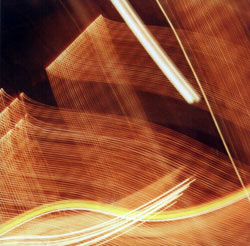
Comprised of bassist Joshua Convey, guitarist Stephen Fiehn and drummer/vibraphonist Steven Hess, all of whom double on electronics, the chroma-key dissolves created by Fessenden immediately recall another enigmatic trio, Radian. Both groups comfortably blur the margins of electroacoustic improvisation, treat the fertile environs of performance and studio as one in the same, and wreak havoc with what us misbegotten mortals construe as "sound" and "music." Like the CD booklet's prismatic lightrays, more brilliant than a dozen suns, Fessenden's constructions simultaneously illuminate and puzzle.
Evidenced by the group's brittle causal events, Other Electricities might have scorched the sky with the release of V1.1, divvying up a catalog whose ear wasn't exactly bent towards abject experimentalism. Right from the opening "Not Sleeping, Just Resting," you know you're not in Kansas anymore (hell, not even within Earthly confines). Dischordant, low-pitched grumbles oscillate below strangely ritualistic shaker noises and what sounds like a half-muted wail foggily pulsing off the event horizon; it's an ominous start, wholly cinematic, indistinct, and even mildly scary, something at odds with the usual run of post-Tortoise impressionists who have traded chance opportunity for more polite contemporary "hard bop" variants. Following this is "Mid-Swing," about as un-metric and far away from the annals of "dance" as is stylistically possible. Convey lets loose a series of bass thrombosi over which Hess melts, oozes, and convulses a conglomerate of metals and mysterious fibrous scuttles; turning up the dial on his amp, guitarist Fiehn unfurls a curdling pattern of spindly shapes that effectively split open the surroundings. This sense of all things vibrating off of shiny chrome surfaces reaches its apex on "Diode," where Radian's ghostdigital paraphernalia finds its doppelganger in Fessenden's morass of pinging synthetics, phased-out dial tones, and stinging acid rain.
Improv, particularly of the electroacoustic variety, has for years retreated into the less confrontational elements of microsound and minimalism, afraid of its shadow, embracing instead great tracts of silence in what has often seemed a vainglorious search for new "frontiers." Some of those recordings have well indeed been enormously successful; conversely, in their controlled chaos, in the bracing complexity of their arrangements, Fessenden appear unafraid to bring on the noise, hook up the toys, and parry with the big boys.
Comments and Feedback:
|



